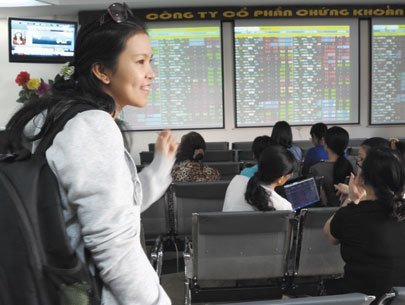VietNamNet Bridge – When the Vietnam Coal and Mineral Industries (Vinacomin)
spent money to buy stakes of the Saigon-Hanoi Bank (SHB) and SHB Securities, or
contributed capital to set up the insurance joint venture SHB-Vinacomin, it
could not imagine that it would have to sell the stakes at a loss one day.
 |
|
|
However, it would be very difficult for them to sell stakes to withdraw capital at this moment, when the stock prices keep decreasing. SHB shares are traded at 8000 dong only, lower than the face value of 10,000 dong, while SHS at 6000 dong. Therefore, no one would accept to buy the stakes from Vinacomin at the initial prices.
In the past, the State Capital Investment Corporation SCIC, a powerful group belonging to the Ministry of Finance once bought back Bao Viet’s stakes from Vinashin (the Vietnam Shipbuilding Industry Group) at the prices equal to the initial cost prices. However, experts believe that SCIC would not do this once again.
Vinashin publicly offers to sell its assets
Some months ago, on the threshold of the consultative group meeting, an official of the Ministry of Planning and Investment said that Vinashin is seeking the partners to transfer its stakes in 32 projects, sells 13 subsidiaries and four other assets.
If Vinashin can sell stakes at the cost prices, Vinashin would take back 4 trillion dong, which is really a big sum of money, if comparing with the current debt worth 19,600 billion dong of the group.
The offer to sell stakes was repeated by Vinashin at a workshop on merger and acquisition held in HCM City recently. However, to date, no institution has sent words imitating that it wants to buy Vinashin’s assets.
Meanwhile, withdrawing capital is an urgent task for Vinashin whose production activities are facing big difficulties. According to the Ministry of Transport, the turnover of the group was 282 billion dong in the first three months of the year, a decrease of 81.5 percent in comparison with same period of the last year. If Vinashin cannot borrow more money would not have money to pay salaries to workers.
If Vinashin accepts to sell the stakes and assets at low prices to stop loss, it may attract venture investors. However, it’s still unclear if Vinashin agrees to sell stakes at low prices, if the State and creditors allow this, if most of Vinashin’s assets have been mortgaged for the loans from the creditors.
It’s not easy to sell at a loss as well
Vinacomin, the Electricity of Vietnam (EVN), the Vietnam National Shipping Lines (Vinalines), Vietnam Post and Telecommunication Group (VNPT), PetroVietnam and Song Da Corporation all have drawn up the reshuffle plans, under which they would take back all the capital invested in non-core business fields by 2015.
This means that the economic groups and general corporations would still have 3.5 years to withdraw capital. If the national economy recovers in some years, selling stakes to take back capital would be completely feasible.
However, the problem lies in the fact that it would be very costly for the groups to keep the stakes. Since they bought the stakes with borrowed money, they have to pay interests every day for the loans. As such, the groups would have to pay money to keep the stakes, though they are not sure about the profitability.
Therefore, in thoughts of many people, bargaining away the stakes to stop loss is a better choice than keeping the stakes. However, it would be very difficult to sell stakes even with a loss, because there are many sellers and few buyers.
EVN plans to sell stakes at An Binh Bank, PetroVietnam plans to sell stakes at Ocean Bank, while Vinatex is seeking those who are interested in the stakes of Nam Viet Bank.
Source: TBKTSG